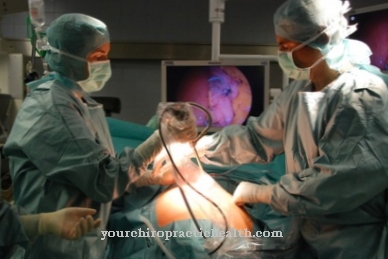The Mouth, jaw, and facial surgery, also Cranio-maxillo-facial surgery or short MKG called, aims to heal injuries, malformations and diseases in the face and mouth area, mostly by means of surgical interventions.
This ranges from small orthodontic procedures that can be performed on an outpatient basis, to the closure of cleft palates, to large, highly invasive interventions, for example for the reconstruction of facial and jaw bones after serious accidents. Plastic surgery operations to be carried out in the facial area, generally known as "cosmetic operations", also fall into this area.
What is oral and maxillofacial surgery?

The aim of the MKG is to heal injuries, malformations and diseases in the face and mouth area, mostly by means of surgical interventions.
The oral and maxillofacial surgeon must be licensed in both dentistry and human medicine and must complete several years of advanced training to become a "specialist in maxillofacial surgery". This enables him to perform complicated operations in the facial area, which may also include the patient's teeth and jaws.
A prospective maxillofacial surgeon must be able to demonstrate extensive experience in the operating room. He also stands out due to his extensive collaboration with colleagues in related fields. This is necessary due to the proximity to organs such as the eyes (ophthalmologist), nose, throat and throat (ENT), brain (neurology), etc., the treatment of which requires extensive consultation with the respective specialist.
In the face and mouth area in particular, many diseases and injuries are extremely complex and therefore require a particularly comprehensive approach from the treating physicians. A maxillofacial surgeon is also usually part of the operation team for operations on the skull that do not take place directly in the facial area, for example to treat a skull or after an accident.
Function, effect & goals
Maxillofacial surgery is responsible for both treatment and diagnostics. This includes the early detection of tumors in the oral cavity, for example, which can be done using a simple brush biopsy, as well as modern, 3D imaging procedures and X-rays.
The anamnesis, the detailed discussion with the patient regarding his complaints, is taken over by the maxillofacial surgeon. There may be misjudgments by patients who incorrectly assign radiating pain, for example perceiving jaw pain as ear pain. Experienced maxillofacial surgeons can often make an accurate diagnosis because they are familiar with the complex interactions of symptoms and discomfort in the mouth, jaw and face area.
The Cranio-Maxillo-Facial Surgery is designed to restore the normal functions of the mouth and throat, such as swallowing, speaking and chewing. Impairments in these areas can arise from independent clinical pictures as well as the consequences of completely different operations, for example tumor removal. Aesthetic reconstruction is also the focus. It is intended to enable patients with severe syndromes, illnesses or after accidents to lead a largely normal everyday life. Malformations in the face and mouth area in particular can hardly be concealed and lead to an enormous psychological burden on those affected.
Therefore, interventions to correct malformations in the facial area, which do not represent any functional impairment of the organism, are beneficial to the psychological well-being of the patient. Frequent interventions involve cleft lip and palate, which is one of the most prevalent malformations in newborns. The operations and treatments include procedures on bones, joints and soft tissues such as the posterior soft palate, salivary glands and inner cheeks. In addition, maxillofacial surgeons can also perform purely dental interventions such as the removal of wisdom teeth or the use of dental implants.
Complaints whose treatment falls within the field of sleep medicine or inflammatory processes can also lead a patient to an oral and maxillofacial surgeon, although this does not correspond to the intuitive understanding of medical laypersons. General practitioners or dentists are often consulted about this. Depending on the case, however, a maxillofacial surgeon can make a more reliable and faster diagnosis and weigh up the extent to which a surgical procedure is necessary. Jaw misalignments, malformations of the nose and the palate can be the cause of sleep disorders and can be eliminated by the maxillofacial surgeon.
Inflammatory processes that can develop into abscesses are possible consequences of infections of the mucous membranes, especially in the mouth and face area. Oral and maxillofacial surgery can also make a comprehensive diagnosis here and decide whether conservative, i.e. drug-based therapy is sufficient or whether inflammatory tissue needs to be surgically removed.
Risks, side effects & dangers
Oral and maxillofacial surgery operations always take place on or in the skull and therefore in the vicinity of the brain, eyes and other organs. General risks of an operation - postoperative inflammation, rupture of the seams, etc. - thus represent an increased risk. Wound infections that break out near the brain and can therefore easily affect it are particularly dangerous.
A possible swelling of surgical wounds in the throat area can also take on life-threatening forms if the swelling goes so far that the airways are blocked. The mouth and throat area is also a possible entry point for pathogens into the organism, which further promotes inflammation. A close monitoring of the patient after operations of the cranio-maxillo-facial surgery is necessary, usually a few days stay in the intensive care unit follow the procedure. If there are complications, it may be necessary to operate again.
The work of maxillofacial surgeons must always be in exchange with colleagues in related fields. This requires a high degree of professional interaction with one another. Maxillofacial surgeons must always include professional opinions from colleagues in other medical fields to a particular extent in their considerations, which generally protects the patient, but also harbors potential for conflict in the event of differing opinions. This is the same in other medical fields, but oral and maxillofacial surgery exacerbates this problem due to its particular complexity.













.jpg)

.jpg)
.jpg)











.jpg)